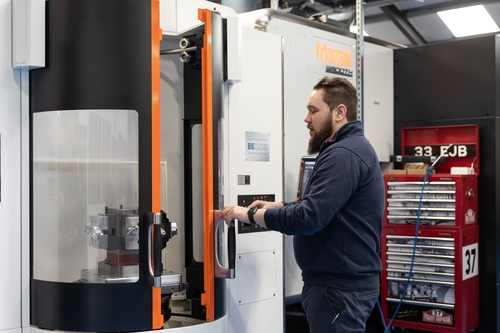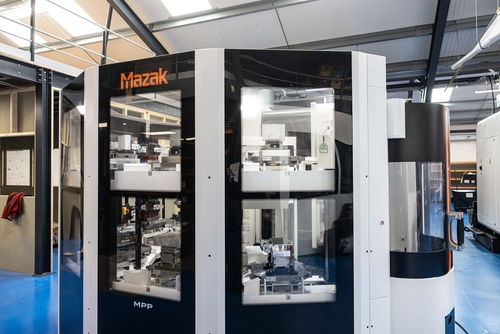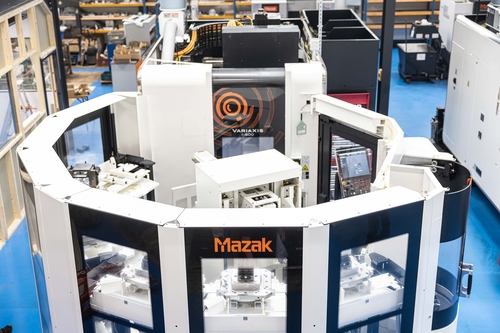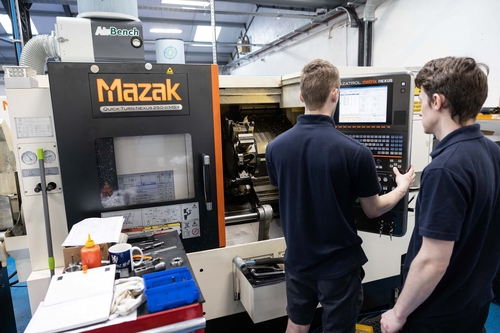Motorsport Advanced Developments, or MAD to those in the know, have a long-standing commitment to investing in the most advanced technology, and the company’s latest automation acquisition is likely to propel their productivity even further.
“If you’re not making swarf, you’re not making money”. That’s the mantra of Daniel Harper at Motorsport Advanced Developments, more often shortened to just MAD.
It’s that commitment to productivity and the willingness to invest that has taken the company from a start-up to being a premier provider of Mini Sport components in less than 20 years.
But there is more to MAD than just Minis. Set up in 2003 in Padiham, near Blackburn in Lancashire, the company now has an exceptionally diverse customer base producing all sorts of automotive components alongside more general subcontracting and R&D work for the aerospace, food and oil and gas industries.

“We were originally set up to produce parts for classic minis as a sister company to Mini Sport, everything from standard parts, through to competition parts and new development parts, but now we’re a much more balanced business,” says Daniel. “If we can make a profit machining it, we’ll do it.”
He continues: “In the early years, our background was not in running CNCs, we were using manual machines. When we decided to get into it, we’d never been involved with CNCs before and we knew we needed some expertise to help us.”
The move into CNC machining was not without a few missteps, however. “In all honesty we chose the wrong supplier and ended up with machines that were not up to the job and were very problematic. Both the lathe and the machining centre we bought broke down more than they were running. It was costing us a lot of money.”
The relationship with Yamazaki Mazak started from there. “I knew the salesperson, so I knew who to get in touch with. We’d always taken the view, wrongly as it turned out, that we couldn’t afford a Mazak. But it’s no good having a cheaper machine if it’s down all the time. When they came in, the people from Mazak made a lot of promises, but they’ve kept them.”
In the years since, MAD has moved quickly into advanced CNC machining, including CADCAM designs, multi-axis CNC milling and turning, prototyping and 3D laser scanning and printing work to the point where MAD is now recognised as being one of the leading suppliers of CNC produced precision engineered components to the automotive sector.
Most importantly, Mazak have supported MAD during the move into more complex machining techniques. “They held our hand a little bit at the start and have done so ever since really. All the Mazak people always seem to want to help. I think that comes from the top, it’s a family company with family values and looking after the customer is in their DNA.”
Since the early days with Mazak, MAD’s machine list has grown to include seven MSY lathes, a VTC-300, a VCN-410, a VCN-530 and a VARIAXIS i-600 5-axis machine.

“Our work is typically small batches in small volumes, one-offs that need to be set, programmed and done quickly,” he says. “That’s the great thing about Mazak machines, we can get setup quickly for the jobs we do, from brake calipers through to drive trains and gearboxes.”
Daniel says the Smooth CNC has also played a key role in making MAD more efficient. “Whatever variant of Smooth Technology you are using it is a very similar experience,” says Daniel. “It’s very intuitive and easy-to-use for all personnel.”
MAD’s latest acquisitions are a departure from the norm, with the company making its first moves into automation. The company has acquired a second VARIAXIS i-600 machine this time equipped with a Mazak Multi-Pallet Pool, or MPP as it is more commonly known, a compact automation solution, ideal for high-mix, low batch production. Initially, MAD specified a six-pallet version of the MPP, but quickly took advantage of the system’s modularity to upgrade.

“The production team at MAD realised they needed more than six pallets as we reached capacity very quickly, but we knew the system was modular so were able to get a 12-capacity stocker ordered to give us more capacity,” says Daniel.
“We do a lot of R&D work and that means there can be a lot of design changes that can hold up the machining process. There is nothing more frustrating than having something sat on the line while you wait for the right tooling to come in. If machines are idle, you aren’t making money.”
“Our other VARIAXIS is used for proving out the component and then it is switched to the MPP for the finishing work,” says Daniel. “With the MPP we can load up multiple jobs to make sure that the VARIAXIS is productive day and night. We prioritise the R&D work for during the day and then still have machining capacity to run lights-out during the night.”

In fact, the first MPP was so successful that MAD has recently taken delivery of an extension to the system. “We’ve just installed an extension to the MPP to cope with demand post-pandemic. We were affected during the first lockdown but work has come roaring back and we can justify the further investment.
“The M65 motorway is a massive aerospace corridor. The expectation is that aerospace will come back as well so we’ll need the MPP to be able cope.”
All in all, Daniel believes the future is positive for the machining industry and for MAD. “The future is bright and our future is going to be with Mazak. We wouldn’t look to go anywhere else.”
